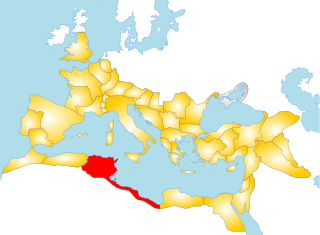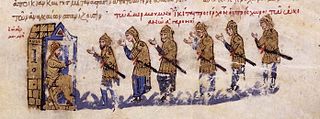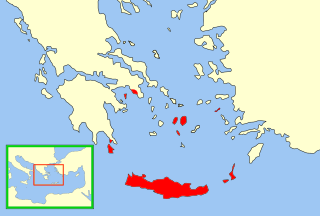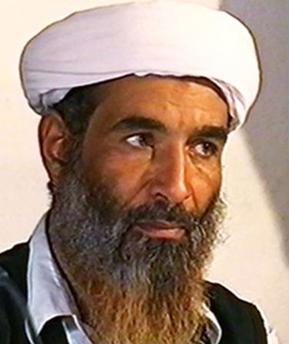
Ifriqiya, also known as al-Maghrib al-Adna, was a medieval historical region comprising today's Tunisia and eastern Algeria, and Tripolitania. It included all of what had previously been the Byzantine province of Africa Proconsularis and extended beyond it, but did not include the Mauretanias.
Abu Musab al-Suri, born Mustafa bin Abd al-Qadir Setmariam Nasar, is a suspected Al-Qaeda member and writer best known for his 1,600-page book The Global Islamic Resistance Call. He has held Spanish citizenship since the late 1980s following marriage to a Spanish woman. He is wanted in Spain for the 1985 El Descanso bombing, which killed eighteen people in a restaurant in Madrid, and in connection with the 2004 Madrid train bombings. He is considered by many as 'the most articulate exponent of the modern jihad and its most sophisticated strategist'.
In Islam, Qirāʼah are different linguistic, lexical, phonetic, morphological and syntactical forms permitted with reciting the holy book of Islam, the Quran. Differences between Qiraʼat are slight and include varying rules regarding the prolongation, intonation, and pronunciation of words, but also differences in stops, vowels, consonants, and less frequently entire words. Qiraʼat also refers to the branch of Islamic studies that deals with these modes of recitation.
Yahya, also spelled Yehya, is an Arabic male given name. It is an Arabic form of the given name John, originally Hebrew Yohanan, i.e. primarily John the Baptist, who is known as Yahya ibn Zakariyya in Islam, and is considered a prophet in Islam. For this reason, Yahya is a comparatively common name in the Muslim world. The related Biblical name of Jehiah has the Arabic form Yaḥiyyā يَحِيَّى., having the same Arabic consonantal text as the name Yahya does.

Abū al-Najīb Abd al-Qādir Suhrawardī (1097–1168) was a Sunni Persian Sufi who was born in Sohrevard, near Zanjan, and founded the Suhrawardiyya Sufi order. He studied Islamic law in Baghdad, later becoming professor of Shafi'ite law at the Nizamiyya school in the same city.

Shahab al-Din Abu Hafs Umar Suhrawardi was a Persian Sufi and nephew of Abu al-Najib Suhrawardi. He expanded the Sufi order of Suhrawardiyya that had been created by his uncle Abu al-Najib Suhrawardi, and is the person responsible for officially formalizing the order. Suhrawardi is the author of the ʿAwārif al-Maʿārif, which is recognized as a masterpiece work in Tasawwuf.

Abu Hafs Umar ibn Hafs ibn Shuayb ibn Isa al-Balluti, commonly known as Umar I of Crete, was the leader of a group of Andalusi refugees who seized control of Alexandria and, after being expelled from the city by the Abbasids, conquered the Byzantine island of Crete, becoming the first emir of Crete.
The University of Timbuktu is a collective term for the teaching associated with three mosques in the city of Timbuktu in what is now Mali: the mosques of Sankore, Djinguereber, and Sidi Yahya. It was an organized scholastic community that endured for many centuries during the medieval period. The university contributed to the modern understanding of Islamic and academic studies in West Africa during the medieval period and produced a number of scholars and manuscripts taught under the Maliki school of thought.
Mahfouz Ould al-Walid, kunya Abu Hafs al-Mauritani, is a Mauritanian Islamic scholar and poet previously associated with al-Qaeda. A veteran of the Soviet–Afghan War, he served on al-Qaeda's Shura Council and ran a religious school called the Institute of Islamic Studies in Kandahar, Afghanistan, from the late 1990s until the American invasion of Afghanistan in 2001.

The Emirate of Crete was an Islamic state that existed on the Mediterranean island of Crete from the late 820s to the reconquest of the island by the Byzantine Empire in 961. Although the emirate recognized the suzerainty of the Abbasid Caliphate and maintained close ties with Tulunid Egypt, it was de facto independent.

Mohammed Atef was the prominent military chief of al-Qaeda, and a deputy of Osama bin Laden, although Atef's role in the organization was not well known by intelligence agencies for years. He was killed in a US airstrike in November 2001.
The Abu Hafs al-Masri Brigades, or Abu Hafs al-Masri Battalions, is a group which claims to be a branch of the Islamic fundamentalist organisation Al-Qaeda.
Najm ad-Dīn Abū Ḥafṣ 'Umar ibn Muḥammad an-Nasafī was a Muslim jurist, theologian, mufassir, muhaddith and historian. A Persian scholar born in present-day Uzbekistan, he wrote mostly in Arabic.
Abu Hafs Umar may refer to:
ʿAbd al-ʿAzīz ibn Shuʿayb ibn ʿUmar al-Qurṭubī al-Ballūṭī, known as Kouroupas in the Byzantine sources, was the tenth and last emir of Crete, ruling from 949 to the Byzantine reconquest of the island in 961.
Muhammad ibn Shu'ayb al-Zarkun al-Balluti, known as Zerkounes in the Byzantine sources, was the fourth Emir of Crete.
Abu Hafs Umar bin Yahya was the Hafsid caliph of Ifriqiya (1284–1295).





